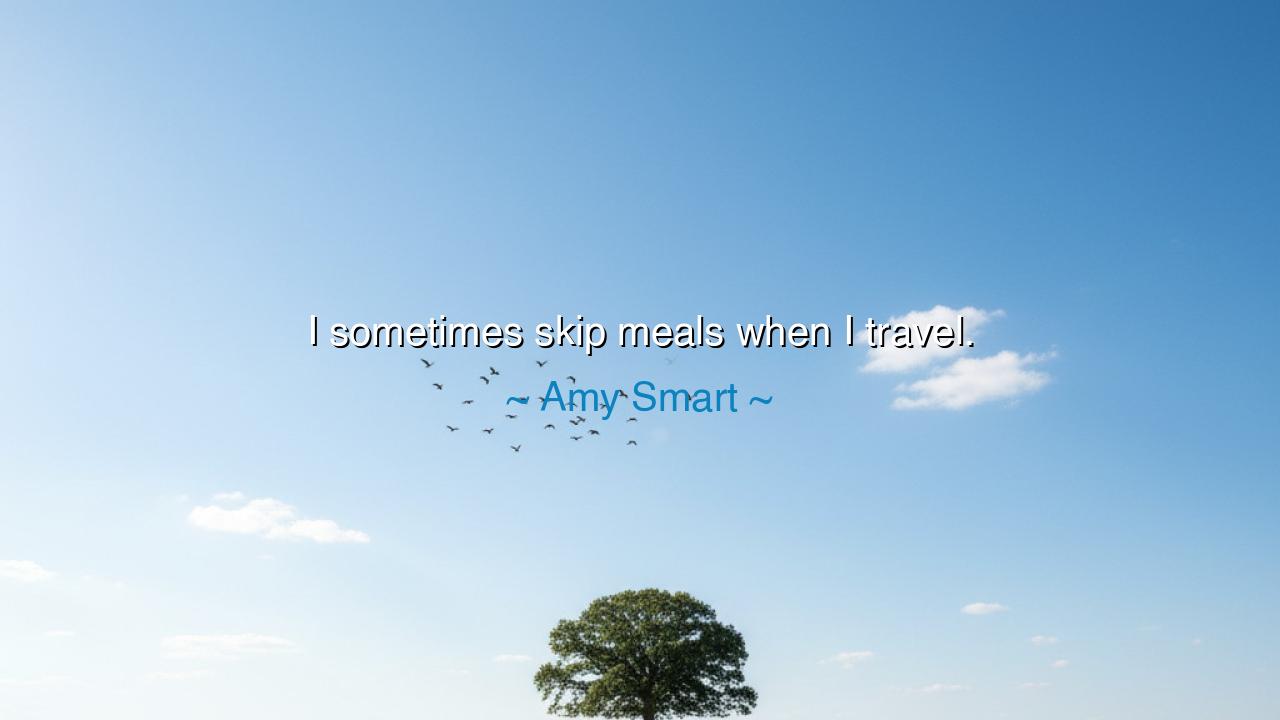
I sometimes skip meals when I travel.






The words of Amy Smart — “I sometimes skip meals when I travel.” — may appear modest, almost fleeting, yet hidden within them is a wisdom that reflects the deeper rhythm of life. For in this small confession we glimpse a truth of the journey: that when one steps into the realm of travel, the ordinary patterns of living are disrupted, and the body bends to the greater call of discovery. To skip meals is not merely to go without food, but to reveal that in moments of movement, wonder, and exploration, the spirit hungers for something beyond bread alone.
The ancients knew this practice well. Pilgrims on sacred paths often fasted as they traveled, believing that abstaining from food cleansed the soul and sharpened the mind. Warriors before battle sometimes withheld from feasting, knowing that emptiness of the body could give rise to clarity of thought and sharpness of will. Thus, when Amy Smart speaks of skipping meals, she echoes an old truth: that to deny the body at times is to awaken the senses, to attune oneself to the world, to let the hunger of the flesh give way to the deeper feast of the spirit.
History gives us striking examples. Consider the great Mahatma Gandhi, who journeyed across India and the world not for conquest, but for freedom. He was often seen fasting, even while traveling among his people. His body weakened, but his soul grew strong, and the hearts of millions were stirred by his discipline. To forgo food while moving through the land was for him not deprivation, but purification — a way to align body, will, and destiny. His choice to skip meals became a symbol of endurance, restraint, and devotion to a cause greater than himself.
Even in less exalted tales, the same principle endures. The traveler who crosses a foreign city and forgets to eat because her eyes are filled with wonder, because her spirit is too alive with the beauty of new sights — she too has tasted this truth. Hunger becomes a companion, not an enemy, and the skipped meal becomes a silent offering to the altar of adventure. To travel is to sacrifice a little comfort so that the soul may drink more deeply of the unknown.
Yet we must not mistake this practice for negligence. It is not a rejection of the body, nor a denial of its needs, but rather a reordering of priorities. At times, the body must wait so that the heart and mind may learn. To skip a meal is to remind oneself that life is not defined only by consumption, but by meaning, purpose, and the richness of experience. It is to say: “For this moment, I am nourished not by bread, but by journey, by vision, by wonder.”
The lesson, then, is this: do not fear small sacrifices along the road of life. To grow, you must sometimes give up comfort. To see the world, you must sometimes leave behind routine. When you feel hunger in your body, ask yourself also about the hunger of your soul. Feed both, but know that there are times when the soul’s feast requires the body’s patience.
Practically, this means embracing discipline in your own journeys. Learn to endure moments of discomfort, for they strengthen you. Practice fasting not only of food, but of distraction, of fear, of needless habits that dull your spirit. Let your travel, whether across lands or within yourself, remind you that the richest nourishment comes not from endless indulgence, but from choosing what truly sustains.
So remember, child of tomorrow: there is wisdom even in the skipping of a meal. For in the emptiness of the stomach, the spirit sometimes hears more clearly the songs of the world. In the sacrifices of travel, you are reminded that life is not measured by what you consume, but by what you awaken to, what you endure, and what you become.






AAdministratorAdministrator
Welcome, honored guests. Please leave a comment, we will respond soon